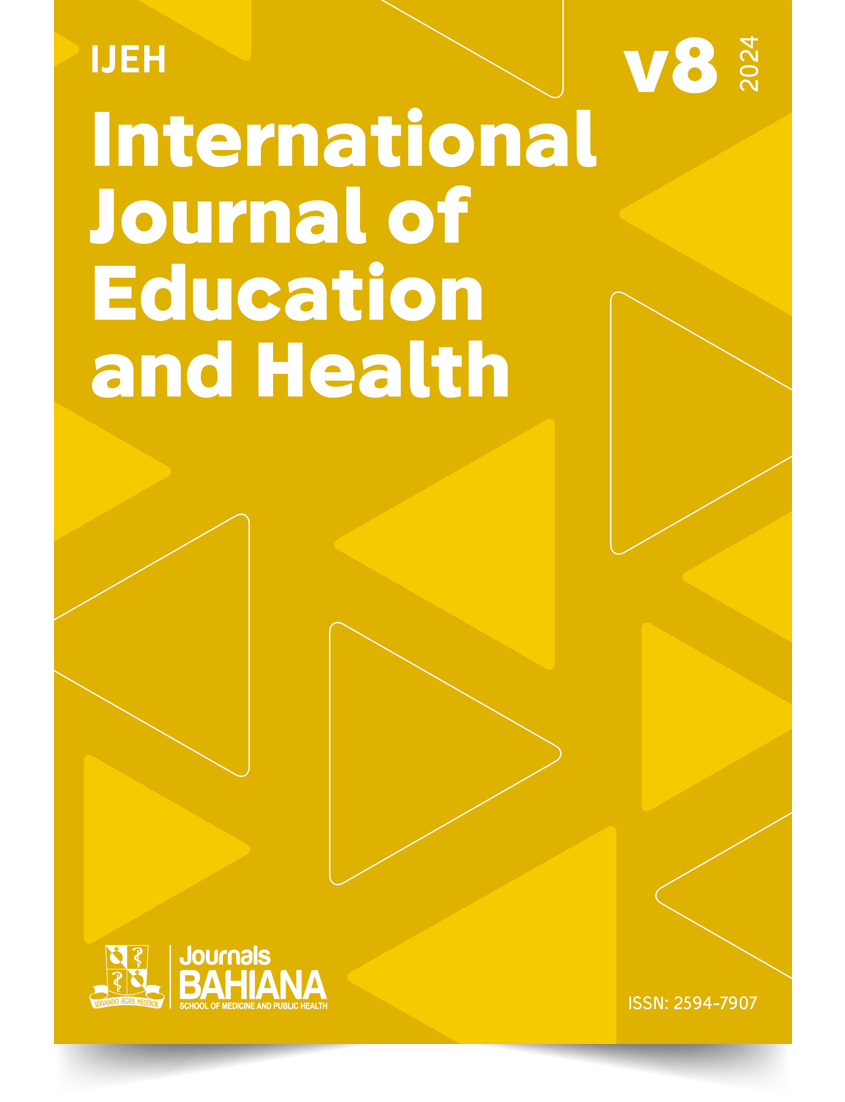Exploring the socioeconomic and dietary reality in disadvantaged communities: experience report
DOI:
https://doi.org/10.17267/2594-7907ijeh.2024.e5614Keywords:
Medical Education, Social Vulnerability, Human Right to Adequate FoodAbstract
INTRODUCTION: The urban concentration of medical schools limits students' exposure to rural challenges, hindering the implementation of guidelines aimed at humanizing professional education. Thus, there is a need for academic activities that address such demands, particularly regarding rural endemic diseases. OBJECTIVES: To report the experience of medical students with home clinical visits to families in socioeconomically disadvantaged conditions in the municipality of São Benedito do Sul, PE. METHOD: Resources obtained from food sales and donations from Procape/UPE resident doctors covered the transportation and accommodation of twelve students and a supervisor. With the assistance of a local Community Health Agent, five families were selected. Forms were applied to collect complaints related to any diseases, dietary content, and housing conditions, in addition to performing physical examination and an electrocardiogram. RESULTS: There was significant precariousness regarding housing and access to healthcare. The total income was on average less than the minimum wage, while education ranged from illiteracy to incomplete elementary education. The households lacked access to showers or toilets. Corn-derived products with processed meat were the staple food, with sporadic consumption of beans, chicken, or eggs. Numerous reports were recorded regarding the precarious state of free healthcare assistance. CONCLUSION: The project experience was crucial in constructing a critical understanding of the expanded concept of health. It was evident that the Sistema Único de Saúde (SUS) does not fully meet the region's demands. A reassessment of the quality of local medical care is necessary to meet the residents' needs.
Downloads
References
(1) Ministério da Educação e Cultura (Brazil). Resolução CNE/CES 3/2014 | Diretrizes Curriculares Nacionais do Curso de Graduação em Medicina [Internet]. Brasília: Ministério da Educação e Cultura; 2014. Available from: http://portal.mec.gov.br/index.php?option=com_docman&view=download&alias=15514-pces116-14&category_slug=abril-2014-pdf&Itemid=30192
(2) Dias JCP, Ramos Júnior AN, Gontijo ED, Luquetti A, Shikanai-Yasuda MA, Coura JR, et al. Brazilian Consensus on Chagas Disease, 2015. Epidemiologia e Serviços de Saúde. 2016;25(21):7–86. Available from: http://scielo.iec.gov.br/scielo.php?script=sci_arttext&pid=S1679-49742016000500007
(3) Machado CDB, Wuo A, Heinzle M. Brazilian Medical Education: a Historical Analysis of Academic and Pedagogical Education. Revista Brasileira de Educação Médica. 2018;42(4):66–73. https://doi.org/10.1590/1981-52712015v42n4RB20180065
(4) Scheffer M. et al. Demografia Médica no Brasil 2023. São Paulo: FMUSP, AMB; 2023.
(5) Silva JL. O controle das endemias no Brasil e sua história. Ciência e Cultura [Internet]. 2003;55(1):44-47. Available from: http://cienciaecultura.bvs.br/scielo.php?script=sci_arttext&pid=S0009-67252003000100026&lng=en
(6) Portaria Nº 397, de 16 de março de 2020 (Brazil). Dispõe sobre o Programa Saúde na Hora [Internet]. Diário Oficial da União. 2020 Mar. 16. Available from: https://bvsms.saude.gov.br/bvs/saudelegis/gm/2020/prt0397_16_03_2020.html
(7) Ministério da Saúde (Brazil), Secretaria de Atenção Primária à Saúde, Departamento de Saúde da Família. Carteira de serviços da Atenção Primária à Saúde (CaSAPS): versão profissionais de saúde e gestores [Internet]. Brasília: Ministério da Saúde; 2019. Available from: https://bvsms.saude.gov.br/bvs/publicacoes/carteira_servicos_atencao_primaria_saude_profissionais_saude_gestores_completa.pdf
(8) Portela GZ. Primary Health Care: an essay on concepts applied to national studies. Physis: Revista de Saúde Coletiva. 2017;27(2):255-76. https://doi.org/10.1590/S0103-73312017000200005
(9) Reis M, Bagolin LA. Arte Como Experiência. Cadernos de Pesquisa. 2011;41(142):314–9. https://doi.org/10.1590/S0100-15742011000100017
(10) Lei nº 8.080, de 19 de setembro de 1990 (Brazil). Dispõe sobre as condições para a promoção, proteção e recuperação da saúde, a organização e o funcionamento dos serviços correspondentes e dá outras providências [Internet]. Diário Oficial da União. 1990 Sept. 20. Available from: https://www.planalto.gov.br/ccivil_03/leis/l8080.htm
Downloads
Published
Issue
Section
License
Copyright (c) 2024 Víctor Câmara Gusmão Cardoso, João Gabriel Alves Leite, Rafael Cabral de Carli, Sarah Carolyne Lima Farias, Maria das Neves Dantas da Silveira Barros

This work is licensed under a Creative Commons Attribution 4.0 International License.
This work is licensed under a Creative Commons Attribution 4.0 International License.



